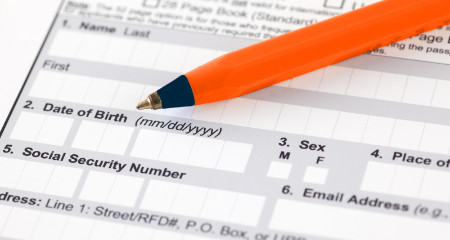Name, Address, Date of Birth, Social Security Number…. Information requirements in the US are fairly simple and standard, both in terms of the list of what’s needed as well as how easy it is to get that information. Addresses are easily validated as are the Social Security Numbers. Once you cross the figurative data border though, into the international zone, it’s another story. Navigating the maze of rules, regulations and sources can be mind-numbing for CRAs performing international background checks.
The data required to run background checks outside of the US can frequently be different, and at times it can seem a bit random. Let’s look at some examples. One piece of information required in other countries, but not in the US, relates to the names of a person’s parents. In India, the father’s last name is often used as an identifier for criminal record checks. While the actual search may be based on the person’s name, to positively match the record to the person, address, Date of Birth and father’s last name may be used. In many Hispanic countries, the mother’s last name can be required. This is because the legal naming convention for many Spanish families is a given name, which can equate to a combination of the first and middle names in the US, along with a first and second last name, or surname. The first surname comes from the father, and the second surname comes from the mother. As an example, take the name José Antonio Gómez Iglesias. José Antonio would be the person’s given name. Gómez is the first last name, coming from the father, and Iglesias is the second last name, coming from the mother. In every day usage, the person might go by José Gómez, or José Antonio Gómez. However, on legal documentation, the person would use their full name including both last names. This is why it is important to collect both the first and second surname when running searches in Hispanic countries.
Background check data changes by country
And just when you have that figured out, the United Kingdom, which many American CRAs presume has great similarity with our own data conventions, throws a curveball. When running criminal searches in the United Kingdom through the Disclosure and Barring Service (DBS), the mother’s maiden name is required. While this is similar in some ways to India and Hispanic countries, the reason is very different. About 20 years ago in the United Kingdom, there was a notorious case where a known criminal passed his criminal vetting because he had been using his mother’s maiden name. This criminal went on to murder 2 girls. An inquiry was opened into the whole affair. One of the recommendations that came out of the inquiry was that the mother’s maiden name should be included when running criminal record checks. (This is a cliff notes version of the story – if you want to dig deeper you can search the Soham murders in the UK.)
International education information can be confusing
 Another piece of information that often causes questions is the need to provide a copy of a person’s degree when doing an educational verification. The response to this request frequently is “Why am I paying you to do a verification if I am getting a copy of the degree?” There are two parts to answering this. The first is that in the age of digital editing, creating realistic fake degrees isn’t that difficult. For proof of this, do a web search for fake Harvard degrees, or any other well-known school. Searching for ‘fake Harvard degree for sale” returned over 4.8 million results on Google. Second, in some school systems, there can be many affiliated colleges. For example, in India, there are hundreds of formally recognized universities – one article cited a little over 800. However, many of these universities have colleges affiliated with them – an article in the Times of India cited over 39,000 affiliated colleges. Because of this, providing a copy of the degree can be useful in helping to determine exactly where a screening company needs to go to do the verification because it may not otherwise be clear which institution holds the academic records.
Another piece of information that often causes questions is the need to provide a copy of a person’s degree when doing an educational verification. The response to this request frequently is “Why am I paying you to do a verification if I am getting a copy of the degree?” There are two parts to answering this. The first is that in the age of digital editing, creating realistic fake degrees isn’t that difficult. For proof of this, do a web search for fake Harvard degrees, or any other well-known school. Searching for ‘fake Harvard degree for sale” returned over 4.8 million results on Google. Second, in some school systems, there can be many affiliated colleges. For example, in India, there are hundreds of formally recognized universities – one article cited a little over 800. However, many of these universities have colleges affiliated with them – an article in the Times of India cited over 39,000 affiliated colleges. Because of this, providing a copy of the degree can be useful in helping to determine exactly where a screening company needs to go to do the verification because it may not otherwise be clear which institution holds the academic records.
In short, while global ordering requirements may seem random, there is usually a good reason for them, often based on cultural or societal differences.
Be Informed to succeed with international background checks
Choosing a reputable background screening data provider is the surest way to avoid handing a client misinformation about a critical hire. At InformData we pride ourselves on having a staff that understands the 200+ countries that we conduct employment background checks in and can ensure reliable, accurate results in the shortest time. If you’re CRA is considering the lucrative market for international verifications, allow us to understand your needs and specify a solution that lets you sleep at night and bank a profit in the morning.


